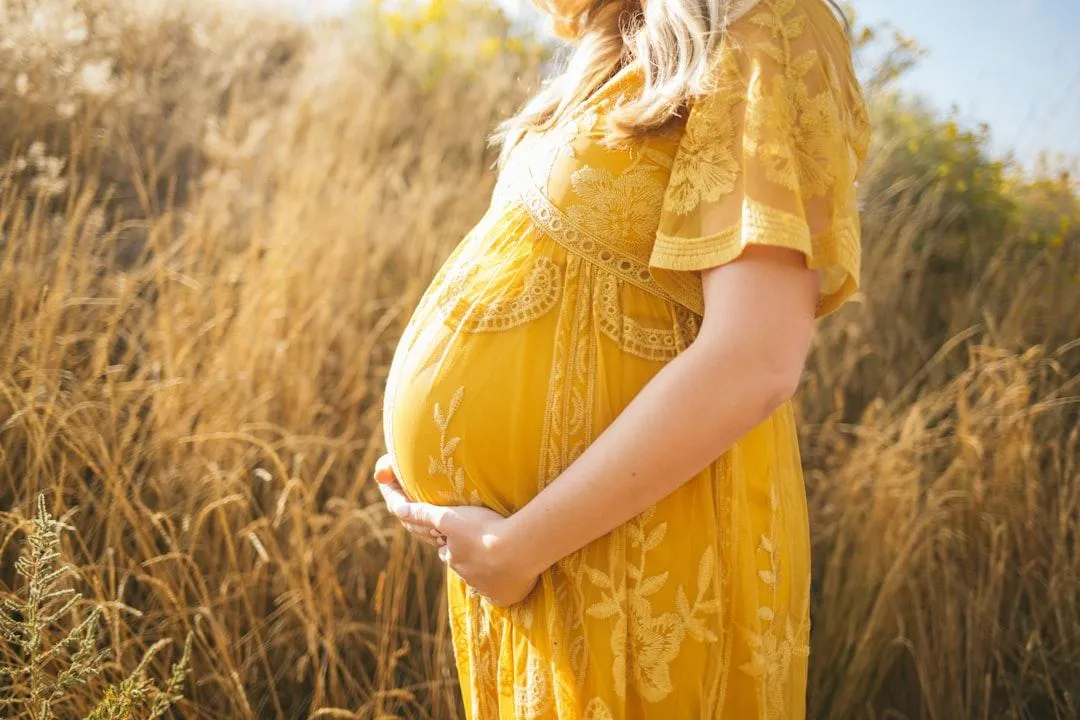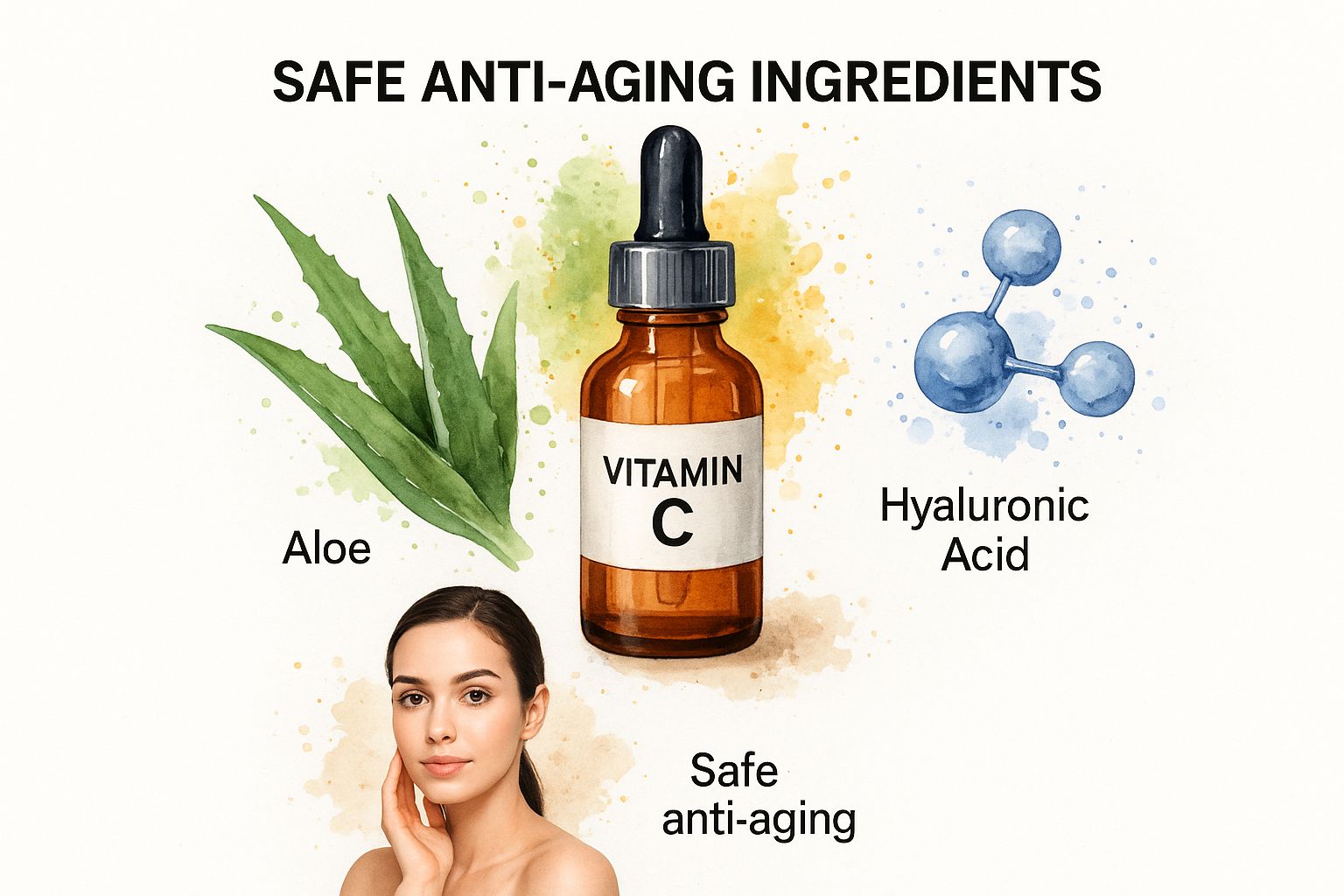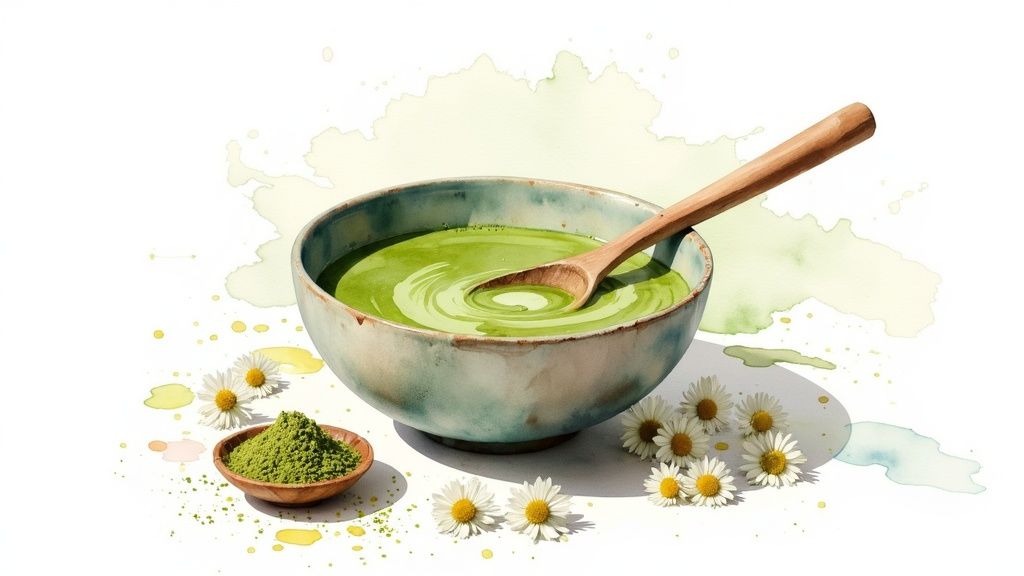
Pregnancy Safe Anti Aging Skincare Guide
Trying to figure out pregnancy safe anti aging skincare can feel like a maze, but getting that vibrant, healthy glow is absolutely within reach, even when you're expecting. Let’s clear up the confusion and talk about the powerful (and safe!) alternatives to your usual routine. This is your go-to guide for feeling confident about your skincare choices.
Your Guide to a Radiant Pregnancy Glow

When you become pregnant, your body goes into overdrive to support your growing baby, and the hormonal whirlwind can really show up on your skin. You might suddenly deal with more sensitivity, frustrating dryness, or new dark spots. Before you know it, your trusted anti-aging serums are off-limits, and you're left wondering what on earth you can still use.
This is where making smart "safe swaps" comes into play. You don't have to give up on your anti-aging goals; you just need to adjust your strategy with ingredients that are both effective and gentle. It’s all about working with your skin's new reality, not fighting against it.
Shifting Your Skincare Philosophy
Forget about aggressive treatments for now. The focus of a pregnancy-safe routine is all about nourishment, deep hydration, and solid protection. This shift doesn’t just help your skin look great today—it actually reinforces its natural barrier, making it stronger and better equipped to handle all those hormonal curveballs.
Here are the key pillars of this new approach:
Prioritizing Hydration: Look for ingredients like hyaluronic acid to deeply moisturize, which naturally plumps the skin and softens the look of fine lines.
Boosting Brightness Safely: Vitamin C is your best friend here. It’s a fantastic antioxidant that helps even out your skin tone without any harsh side effects.
Gentle Exfoliation: Instead of strong peels, reach for low-concentration AHAs like lactic acid to keep your skin smooth and clear.
Consistent Sun Protection: This is non-negotiable. A mineral-based, broad-spectrum sunscreen every single day is your number one tool against premature aging.
Focusing on these core ideas helps you build a routine that truly supports your skin for the long haul. The right products, combined with a little professional guidance, can make a world of difference in how radiant and confident you feel.
This guide will walk you through creating a simple, effective regimen that keeps your skin nourished while still tackling your anti-aging goals safely. And if you're looking for some extra support, a professionally designed pregnancy-safe facial can give you that tailored care and peace of mind, ensuring your skin gets the expert love it needs through every trimester.
Why Your Skin Changes During Pregnancy
When you're pregnant, your body is doing some pretty incredible things, and your skin is right there along for the ride. A massive surge in hormones, especially estrogen and progesterone, kicks into high gear to support your growing baby. But these same hormones also have a major say in how your skin behaves, often leading to some surprising new issues.
Think of this hormonal shift as the primary culprit behind most of the common skin complaints during pregnancy. For example, that spike in estrogen can send your pigment-producing cells (melanocytes) into overdrive, setting the stage for one of the most talked-about skin changes of all.
The "Why" Behind Common Skin Concerns
Getting a handle on why your skin is suddenly acting out is the first step in picking the right pregnancy-safe anti-aging products. The changes you're seeing aren't random; they're a direct response to what's happening inside your body.
Melasma (The "Mask of Pregnancy"): If you've noticed patchy brown or grayish spots, usually on your face, you're not alone. The hormonal surge makes your skin hyper-sensitive to the sun, triggering this extra pigment. This is why sunscreen becomes your absolute best friend.
Hormonal Acne: An uptick in certain hormones can rev up your skin's oil production. All that extra oil can easily clog pores and lead to breakouts, even if you’ve enjoyed clear skin for your entire adult life.
Increased Dryness and Sensitivity: While some women get oilier, many others find their skin becomes incredibly dry, tight, and sensitive. Hormonal shifts can weaken your skin's natural protective barrier, which means it can't hold onto moisture as well and is more likely to get irritated by products that used to be totally fine.
Why This Matters for Your Anti-Aging Routine
Because your skin is behaving so differently, your trusty old routine might suddenly stop working—or worse, become unsafe. With its new heightened sensitivity, ingredients that were once your go-tos could now cause redness, itching, or full-blown irritation.
The real goal here is to adapt. Instead of trying to fight these changes with aggressive products, you want to shift your focus to gentle nourishment, calming inflammation, and protecting that compromised skin barrier.
This new reality is exactly why it's so critical to talk about safe skincare during pregnancy. With over 90% of pregnant women experiencing significant skin changes, there's a huge need for products that can support elasticity and hydration without posing any risks. You can find more insights into this growing market for pregnancy-safe skincare on DataHorizzon Research.
Once you understand the "why" behind what's happening with your skin, you can feel much more confident choosing ingredients that offer anti-aging benefits safely. It creates a solid foundation for knowing what to use and what to put on pause for a while.
Your Pregnancy-Safe Anti-Aging Toolkit
Now that we've covered why your skin is acting so differently, let's get to the good part: what you can use to keep your skin looking and feeling its best. Creating a great anti-aging routine during pregnancy isn’t about compromise; it’s about choosing powerful, gentle ingredients that do the work without any risk.
The great news? You have more options than ever. The demand for pregnancy-safe skincare has exploded, with the global market expected to hit around $2.5 billion by 2025. This surge in awareness means better, more effective formulas are readily available.
Meet Your Core Anti-Aging Allies
It's easy to focus on what's off-limits, but let's shift our attention to the powerhouse ingredients that will become your new best friends. These multitasking heroes are brilliant for tackling fine lines, dullness, and uneven skin tone—all while being completely safe for you and your baby.
Here's a quick visual of the key players you'll want on your team.

As you can see, ingredients like Vitamin C and Hyaluronic Acid form the backbone of a safe and effective skincare routine during this special time.
Let's dive a little deeper into these top contenders:
Vitamin C: This is your go-to for a brighter, more even-toned complexion. As a potent antioxidant, it helps shield your skin from environmental stressors, encourages collagen production to keep things firm, and works wonders on those pesky dark spots.
Hyaluronic Acid: Think of this as a big drink of water for your skin. It can hold up to 1,000 times its weight in water, pulling moisture deep into the skin. The result is a plump, dewy look that instantly softens the appearance of fine lines.
Niacinamide (Vitamin B3): A true skincare workhorse. Niacinamide is fantastic for strengthening your skin’s natural barrier, which can often feel a bit fragile during pregnancy. It’s also brilliant at calming redness and improving overall skin texture.
When you build your routine around these foundational ingredients, you're not just putting a band-aid on aging concerns. You’re actively creating healthier, more resilient skin that’s better equipped to handle all the hormonal ups and downs.
Your Go-To Ingredient Guide
To make things even easier, here’s a quick-reference table. Think of it as your cheat sheet for picking the right ingredients for your specific goals.
Pregnancy-Safe Anti-Aging Ingredient Guide
IngredientPrimary Anti-Aging BenefitHelps WithVitamin CBrightens & firms skinDullness, sun damage, dark spotsHyaluronic AcidDeeply hydrates & plumpsFine lines, dehydration, drynessNiacinamideStrengthens skin barrierRedness, uneven texture, large poresAzelaic AcidEvens skin tone & textureMelasma, breakouts, inflammationBakuchiolBoosts cell turnoverFine lines, wrinkles, loss of elasticity
This table helps you quickly connect an ingredient to its benefit, so you can confidently build a routine that works for you.
Targeted Solutions for Specific Concerns
Sometimes, you need a little extra help for specific issues like melasma or a safe way to tackle wrinkles. That’s where these next two ingredients shine.
Azelaic Acid is a dream ingredient for expectant mothers. It’s a multi-tasker that helps fade melasma (the "mask of pregnancy") while also keeping hormonal breakouts in check. It works by gently exfoliating, calming inflammation, and blocking the enzyme that triggers excess pigment. If breakouts are a primary concern, our guide to pregnancy safe acne treatment offers more tips that pair perfectly with azelaic acid.
Bakuchiol has rightfully earned its crown as the best plant-based alternative to retinol. It offers remarkably similar anti-aging results—speeding up cell turnover and improving elasticity—without any of the safety concerns or potential irritation of retinoids. It’s the perfect swap to ensure you can keep targeting fine lines and wrinkles throughout your pregnancy.
Ingredients and Treatments to Pause for Now
When you're pregnant, tweaking your anti-aging routine is less about sacrifice and more about smart swaps. Think of it as a temporary detour, not a complete stop. The whole point isn't to create a long list of scary "don'ts," but to give you the confidence to glance at a label and know exactly what you're looking at.
Most of the ingredients we're about to talk about are on the "pause" list simply because they haven't been—and ethically can't be—studied on pregnant women. So, doctors and dermatologists take a "better safe than sorry" approach, recommending you set them aside until after your baby arrives and you're done breastfeeding.
The Big Three Skincare Ingredients to Avoid
As you start scanning your product labels, you'll find there are really just three main players in the anti-aging world to steer clear of for now. These are the powerhouses of traditional skincare, but their potential risks during pregnancy just aren't worth it.
Retinoids (All Vitamin A Derivatives): This is the big one. Whether it's a prescription like Tretinoin or over-the-counter versions like Retinol and Retinyl Palmitate, all forms of Vitamin A are a no-go. High doses have been linked to a risk of birth defects, and while the amount you absorb through your skin is probably small, nobody wants to take that chance.
Hydroquinone: This is a popular ingredient for fading dark spots and melasma, but it has a surprisingly high systemic absorption rate—somewhere between 35% to 45% of it can enter your bloodstream. Since there's not enough data to prove it's safe during pregnancy, it’s best to avoid it completely.
High-Dose Salicylic Acid: A face wash with a low dose of salicylic acid (under 2%) is generally considered fine. What you need to avoid are high-concentration serums, leave-on treatments, and professional peels. It’s a beta-hydroxy acid (BHA) that's related to aspirin, and in high amounts, it carries a theoretical risk.
The best thing you can do is become a pro at reading labels. Once you know these three names, you can spot them in a flash and make a confident choice about what stays on your shelf.
Professional Treatments to Postpone
It's not just about your at-home products; some in-office treatments need to be put on hold, too. While a little pampering is definitely a good thing, certain procedures are either too intense for hormonally-charged skin or involve tech that hasn't been proven safe for pregnancy.
It’s best to wait on these until after delivery and breastfeeding:
Aggressive Chemical Peels: Those deep, intense peels using high concentrations of salicylic, glycolic, or TCA are off the table for now. They can easily lead to major irritation or even worsen the hyperpigmentation that pregnancy skin is already prone to.
Certain Laser Treatments: Many laser therapies, particularly ablative ones that intentionally wound the skin to stimulate healing, just haven't been studied for safety during pregnancy. It’s an easy one to postpone.
Microneedling: While amazing for boosting collagen, the procedure involves creating tiny injuries in the skin. This introduces a risk of infection, and with your hormones fluctuating, your skin's healing response can be unpredictable.
Hitting pause on these ingredients and treatments is a simple, proactive way to have a worry-free nine months. By sticking to the safe and effective alternatives out there, you can keep taking care of your skin without a second thought. And, of course, always chat with your doctor or dermatologist about your routine—they can give you the best personalized advice.
Building Your Daily Anti-Aging Skincare Routine

Knowing which ingredients are safe is a huge first step. But the real magic happens when you bring them all together into a simple, effective routine. When your skin feels unpredictable, consistency is so much more important than complexity. The good news? You don't need a dozen steps to see real results.
A solid pregnancy-safe anti-aging plan can be built on a simple framework: Cleanse, Treat, Hydrate, and Protect. This approach makes sure your skin gets exactly what it needs, day and night, without ever feeling overwhelming. Think of it as your daily skincare blueprint.
Your Simple Morning Skincare Routine
Your morning routine has two main goals: to shield your skin from whatever the day throws at it and to prep it for the hours ahead. It should be quick, effective, and all about defense.
Cleanse Gently: Start your day with a mild, hydrating cleanser. I always recommend a soap-free, fragrance-free formula that won’t strip away your skin's natural oils. Those oils are crucial for keeping your skin barrier healthy and strong.
Treat with Vitamin C: On clean, dry skin, apply a Vitamin C serum. This is an antioxidant powerhouse that helps protect your skin from environmental damage, brightens up your complexion, and even supports collagen production to keep things firm.
Hydrate and Nourish: Next up, a good moisturizer with something like hyaluronic acid or niacinamide. This step is all about locking in moisture, which helps plump the skin to soften the look of fine lines and calm any redness.
Protect with SPF: This is, without a doubt, the most critical anti-aging step you can take. Every single morning—rain or shine—apply a broad-spectrum mineral sunscreen with at least SPF 30.
Protecting your skin from the sun is non-negotiable during pregnancy. Hormonal shifts can make you more susceptible to melasma (the "mask of pregnancy"), and a daily SPF is your number one defense against both unwanted pigmentation and premature aging.
Google Trends data actually backs this up, showing searches for "pregnancy safe sunscreen" tend to spike in the summer when sun exposure is at its peak. It's a clear sign that expecting moms know sun protection is a top priority for preventing photoaging. You can learn more about trends in pregnancy-safe skincare on Accio.
Your Restorative Evening Skincare Routine
Nighttime is your skin’s chance to repair and reset. Your evening routine should focus on washing away the day and delivering nourishing ingredients that support this natural healing process while you sleep.
Double Cleanse: I’m a big believer in the double cleanse. Start with an oil-based cleanser to dissolve makeup and sunscreen, then follow up with your gentle morning cleanser to get your skin completely clean.
Treat with Bakuchiol or Azelaic Acid: Now is the perfect time to bring in your retinol alternative. Apply a bakuchiol serum to target fine lines and improve elasticity. If pigmentation is more of a concern for you, azelaic acid is another fantastic choice.
Hydrate Deeply: Finish with a richer, more nourishing moisturizer than the one you use in the morning. Look for formulas with ingredients like peptides or ceramides to really help repair and strengthen your skin’s barrier overnight.
By sticking to this simple structure, you’re creating a consistent and powerful routine. For a more detailed walkthrough, you can check out our guide on building a full pregnancy skincare routine. This simple plan proves you can absolutely keep up with your anti-aging goals safely and effectively.
Answering Your Burning Pregnancy Skincare Questions
Even when you think you have it all figured out, questions about your pregnancy skincare routine are bound to pop up. That's completely normal. To help you feel more confident, I've rounded up some of the most common questions I hear and broken down the answers.
Can I Just Swap My Retinol for Bakuchiol?
You absolutely can. There's a good reason why bakuchiol is celebrated as the go-to pregnancy-safe alternative to retinol. While it's a totally different compound from Vitamin A, it works in a surprisingly similar way, encouraging cell turnover and boosting collagen.
This means it can help soften the look of fine lines and improve your skin's overall texture, giving you those anti-aging perks you don't want to give up, but without the risks tied to retinoids. It’s a gentle, plant-based powerhouse that’s perfect for this special time. Of course, with anything new, a little patch test first is always smart.
Are All "Natural" or "Organic" Products Safe During Pregnancy?
This is a huge misconception, and the short answer is no, not always. Terms like "natural" and "organic" aren't regulated in the beauty industry, so they don't automatically mean a product is safe for you or your baby.
For example, many essential oils are 100% natural but are not recommended for use during pregnancy. The trick is to ignore the marketing buzzwords on the front of the bottle and flip it over to focus on the actual ingredient list. Always scan for specific ingredients to avoid, like retinoids, even if a product is labeled as "clean."
Your focus should be on specific, proven-safe ingredients, not broad marketing claims. Where an ingredient comes from doesn't determine its safety during pregnancy—its chemical properties and how it interacts with your body do.
What’s the Best Sunscreen to Prevent Aging and Melasma?
Mineral sunscreens are the undisputed champions here. When you're shopping, look for formulas with Zinc Oxide or Titanium Dioxide listed as the active ingredients.
Here’s why they’re so highly recommended:
They create a physical shield: Instead of being absorbed into your skin, these minerals sit on the surface, physically blocking and reflecting harmful UV rays away. Think of it like a mirror for the sun.
They’re gentler on sensitive skin: Because they aren’t absorbed into the bloodstream, they are considered the safest option. They're also far less likely to cause irritation—a huge bonus when pregnancy hormones have your skin feeling a bit touchy.
Making a broad-spectrum mineral sunscreen with at least SPF 30 a non-negotiable part of your daily routine is the single most important thing you can do to fight premature aging and keep melasma in check.
My Skin Has Become So Sensitive. What Do I Do?
First off, know you're not alone. Soaring hormones can weaken your skin's protective barrier, making it much more reactive. The best thing you can do is to strip your routine back to the bare essentials right away.
Pare it down to just these key players:
A gentle, soap-free, and fragrance-free cleanser.
A simple hydrating serum with an ingredient like hyaluronic acid.
A calming moisturizer, maybe one with niacinamide to help strengthen that skin barrier.
Your daily mineral sunscreen.
That's it. Hold off on introducing any new active ingredients until your skin calms down. The goal right now is just to soothe, hydrate, and protect. If the sensitivity is really severe or just won't quit, it's always a good idea to check in with a dermatologist.
Navigating skincare during pregnancy should feel empowering, not overwhelming. For personalized advice and professional treatments that are completely safe for you and your baby, explore the custom facial options at Olive Skin Therapy. Book your consultation today and let an expert guide you to your most radiant pregnancy glow. Find out more at https://oliveskintherapy.com.
